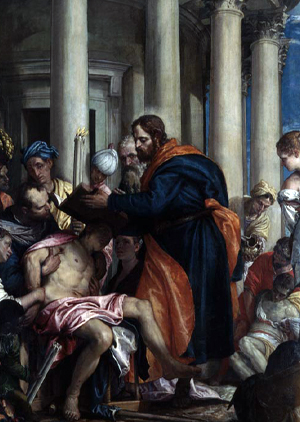Scripture:
Acts 11:21b-26; 13:1-3
Matthew 5:13-16
Reflection:

We have all heard the derogatory term, “playing second fiddle.” As in: “I’m the star of this show, and I’m not playing second fiddle to anyone.” To play second fiddle means to play a secondary role in the shadow of someone else. called second fiddle means one is less important than someone else.
Now, consider Barnabas. He was an important leader in early Christianity’s mission work. He was top of mind, always first for his fellow Christians. And he was beloved among them. Why? Because he could see and believe in the goodness and potential in people.
Barnabas, for example, believed in Paul, even though Paul had once been a feared persecutor of Christians. But Paul insisted that on the road to Damascus a thunderous voice from heaven called him to become a follower of Christ. Nevertheless, no one believed him; they stayed away from him; refused to trust this Christian hater.
Not Barnabas. He saw something special in Paul. Barnabas was willing to stake his reputation on Paul. Barnabas invited Paul to work with him in mission.
Interestingly, the early chapters of Acts always spoke of “Barnabas and Paul.” Barnabas’ name always came first. Then in Acts 13, a subtle change occurred. Gradually, the Christian community began to respond to Paul’s mission to the Gentiles. Now, it was no longer “Barnabas and Paul.” Now it was “Paul and Barnabas.” Paul overshadowed Barnabas. Barnabas was relegated to playing second fiddle to the Apostle Paul. By the way, Barnabas was not his real name. Joseph was his name.
Barnabas was his nickname. They called him Barnabas because it best described the character of this man. The nickname Barnabas means “Son of Encouragement.” And so he was.
He encouraged Paul to join him in mission. And Paul became the great Apostle to the Gentiles and writer of many letters to the communities throughout the Roman World.
Barnabas encouraged his cousin Mark. Young John Mark joined Paul and Barnabas on their first missionary journey. But after a time, Mark became homesick, tired, unable to continue the difficult journey. So he quit. He went home.
Years later, John Mark asked to accompany Paul and Barnabas on their next missionary journey. Paul said “no. No quitters on my team.” Barnabas said “yes. Give this young man a second chance.” As a consequence, Paul and Barnabas had a parting of the ways. Paul went his way on mission, and Barnabas, with Mark, took another route on their missionary journey.
And what became of Mark? He became an evangelist of the Church, the first to write the Good News, the Gospel of Jesus. Ironically, Barnabas would play second fiddle to his younger cousin.
The second fiddle. That term originated in the early days of orchestra. An orchestra has the first violinist who sits at a prominent chair and to the immediate left of the conductor. The first violinist is the lead violinist and plays the melody in a symphony.
Then there is the second violinist who leads the group of second violins.
They play a subordinate and supportive role to the first violinist.
This second group gradually came to be referred to as the second fiddles, a rather unflattering term for those who sit in the shadow of the first violin.
Leonard Bernstein, the late conductor of the New York Philharmonic Orchestra, was asked during an interview to name the most difficult instrument in an orchestra. Without hesitation, Bernstein replied: “The second fiddle. I can get plenty of first violinists, but to find someone who can play second fiddle with enthusiasm, that’s a problem. If we have no second fiddle, we have no harmony.”
Barnabas, “the Son of Encouragement,” was the second fiddle who gave the early Church the harmony it needed in its nascent days.
The Church today is beset by polarization, division, and distrust. Barnabas nevertheless encourages us to become a Church where people of vastly different perspectives can build on a shared unity in Christ.
Barnabas invites us to join him with the second violins. Only then, will we second fiddles play the harmony of mystical music our Church sorely needs today.
Deacon Manuel Valencia is on the staff at Mater Dolorosa Passionist Retreat Center, Sierra Madre, California.
